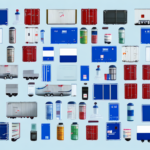What Is a US Courier Company?
A courier company is a specialized service provider that offers transportation and delivery of documents, packages, and parcels. These services are delivered within specified time frames and often include express and same-day delivery options. In the United States, courier companies play a vital role in the distribution and logistics industry, providing a wide range of services to both individuals and businesses. This section explores the core functions and importance of courier companies in the US.
Key Services Offered
- Express Deliveries
- Same-Day Services
- Overnight Shipping
- International Shipping
- Specialized Delivery (e.g., medical, legal)
As of 2023, the US courier industry is valued at over $70 billion, reflecting its critical role in e-commerce and global trade.
The History of US Courier Companies
The courier industry in the US boasts a rich history dating back to the mid-1800s. It all began with the Pony Express, a mail delivery service renowned for its rapid delivery times and its role in disseminating news and information across vast distances. However, the advent of telegraphs and railroads rendered the Pony Express obsolete, paving the way for the modern courier industry that emerged in the early 1900s.
Throughout the 20th century, courier services flourished in the US with the establishment of major companies such as United Parcel Service (UPS), Federal Express (FedEx), and DHL Global, which came to dominate the market.
Technological Advancements and Industry Evolution
In recent years, the US courier industry has experienced significant transformations driven by technological advancements. The rise of e-commerce has necessitated rapid adaptation by courier companies to meet the demands of online shoppers. This has led to the development of new delivery options, such as same-day and next-day delivery services.
Furthermore, innovations like drones and autonomous vehicles are being explored to enhance delivery efficiency and reduce costs. Courier companies have also implemented advanced tracking and communication systems, enabling customers to receive real-time updates on their shipments. As the industry continues to evolve, emerging technologies and innovations are expected to shape the future of courier services in the US.
The Different Types of Courier Services Offered in the US
Courier companies provide a diverse range of services tailored to meet the specific needs of their clients. These services include:
- Same-Day Delivery: Allows shipments to be picked up and delivered within the same day, ideal for urgent deliveries.
- Express Delivery: Time-bound delivery options with guaranteed delivery times, often used for critical shipments.
- Overnight Delivery: Ensures delivery by the next day, suitable for time-sensitive packages.
Specialized Courier Services
Beyond standard delivery options, many courier companies offer specialized services to cater to specific industries:
- Medical Courier Services: Designed to transport medical supplies, equipment, and specimens between hospitals, clinics, and laboratories.
- Legal Courier Services: Used for transporting legal documents, court filings, and other sensitive materials between law firms, courts, and government agencies.
- Freight Courier Services: Facilitates the transport of large and heavy items such as furniture, machinery, and equipment.
Tracking and Delivery Confirmation
Effective tracking and delivery confirmation systems are essential components of courier services:
- Online Tracking Systems: Enable customers to monitor their shipments in real-time through the company's website or mobile app.
- Delivery Confirmation: Provides proof of delivery, often including signature confirmation upon receipt.
These systems ensure that shipments are delivered promptly and reach the intended recipients accurately, enhancing reliability and customer satisfaction.
Why Use a Courier Company for Your Deliveries?
Choosing a courier company for your delivery needs offers numerous advantages, including:
- Speed and Reliability: Courier companies provide fast and dependable delivery services, often offering same-day and next-day delivery options to meet urgent requirements.
- Real-Time Tracking: Advanced tracking systems allow customers to monitor their shipments in real-time, providing peace of mind and transparency.
- Extensive Network: A robust network of delivery personnel and vehicles ensures efficient and cost-effective delivery across various regions.
These features are especially crucial for businesses that need to fulfill orders swiftly and maintain high customer satisfaction.
Specialized Delivery Services
In addition to standard services, courier companies provide specialized delivery options tailored to specific needs:
- Temperature-Controlled Transportation: Ideal for perishable goods, ensuring items like food and pharmaceuticals remain at required temperatures during transit.
- Secure Delivery: Facilitates the safe transport of confidential documents and sensitive materials, providing enhanced security measures.
- White-Glove Delivery: Offers meticulous handling and delivery of fragile or high-value items, ensuring they arrive in pristine condition.
Moreover, courier companies possess expertise in navigating customs regulations and managing international shipping logistics, making them invaluable partners for businesses operating on a global scale.
Top US Courier Companies and Their Services
The US courier industry is home to numerous companies, each offering a unique set of services to cater to diverse customer needs. Some of the leading courier companies include:
- UPS (United Parcel Service): One of the largest courier companies globally, UPS offers a comprehensive range of delivery options, including ground, air, and ocean freight services. They also provide extensive logistics and supply chain management solutions.
- FedEx: Renowned for its fast delivery times, FedEx operates an extensive network of delivery providers worldwide. Their services include express shipping, freight, and e-commerce solutions tailored for businesses of all sizes.
- DHL Global: DHL offers a variety of services such as air and ocean freight, express deliveries, and comprehensive logistics solutions. They cater to both domestic and international shipping needs.
Regional and Specialized Courier Services
In addition to these major players, the US market features several smaller, regional courier companies that specialize in specific areas or industry niches:
- OnTrac: Operating primarily in the western United States, OnTrac offers reliable same-day and next-day delivery services, focusing on speed and efficiency in their service areas.
- LaserShip: Specializing in last-mile delivery, LaserShip operates in the eastern and midwestern regions of the US, providing expedited shipping solutions tailored for e-commerce and retail businesses.
These smaller courier companies often provide more personalized service and tailored solutions, making them ideal partners for businesses with specific delivery requirements or those operating within certain geographic regions.
How to Choose the Right Courier Company for Your Needs
Selecting the appropriate courier company for your specific requirements involves careful consideration of several key factors:
- Delivery Times: Evaluate the company's ability to meet your required delivery schedules, whether you need same-day, next-day, or standard delivery options.
- Range of Services: Consider the variety of services offered, including specialized delivery options, international shipping, and logistics solutions tailored to your business needs.
- Tracking Options: Ensure the courier provides reliable tracking systems that offer real-time updates and visibility into your shipments.
- Pricing: Compare pricing structures among different courier companies to ensure you receive competitive rates without compromising on service quality.
- Customer Service: Assess the quality of customer support, including availability, responsiveness, and the ability to resolve issues promptly.
Steps to Selecting the Right Courier
- Identify Your Needs: Determine the volume, size, and nature of the shipments you need to send, as well as any specific service requirements.
- Research and Compare: Explore different courier companies, comparing their service offerings, coverage areas, and pricing.
- Read Reviews and Testimonials: Gain insights from other customers by reading reviews and testimonials to assess reliability and service quality.
- Request Quotes: Obtain quotes from multiple providers to understand potential costs and negotiate better rates if possible.
- Test Services: Consider starting with small shipments to evaluate the courier's performance before committing to larger or long-term contracts.
By thoroughly evaluating these factors, you can select a courier company that aligns with your delivery requirements and ensures a seamless shipping experience.
The Advantages and Disadvantages of Using a Courier Service
Advantages
- Speed and Reliability: Courier services provide fast and dependable delivery options, ensuring timely arrival of shipments.
- Real-Time Tracking: Advanced tracking systems offer visibility into the status and location of your shipments, enhancing transparency.
- Personalized Service: Many courier companies offer tailored solutions to meet specific customer needs, including specialized handling and delivery options.
- Enhanced Security: Secure handling of sensitive and valuable items reduces the risk of loss or damage during transit.
- Global Reach: Access to international shipping services enables businesses to expand their market reach globally.
Disadvantages
- Higher Costs: Courier services are generally more expensive than standard mail delivery, which may be a concern for budget-conscious customers.
- Size and Weight Limitations: There may be restrictions on the size and weight of items that can be shipped, potentially limiting what you can send.
- Dependency on Provider: Relying heavily on a courier service means that any issues with the provider can directly impact your delivery timelines and customer satisfaction.
Despite the drawbacks, the numerous advantages of courier services—such as expedited delivery, reliable tracking, and personalized support—often make them the preferred choice for individuals and businesses requiring efficient and secure shipping solutions.
The Future of US Courier Companies: Trends and Predictions
The courier industry is in a state of continuous evolution, influenced by changing consumer behaviors, technological advancements, and global economic trends. Several key trends are expected to shape the future of US courier companies:
1. Growth of E-Commerce and Same-Day Delivery
The surge in e-commerce has significantly boosted demand for courier services, particularly for same-day and next-day delivery options. As consumers increasingly expect faster delivery times, courier companies are expanding their service offerings to meet these expectations, driving industry growth and prompting more players to enter the market.
2. Adoption of Advanced Technologies
- Automated Vehicles: Self-driving trucks and delivery vans are being tested and implemented to streamline operations, reduce labor costs, and enhance delivery speed.
- Drones and Unmanned Aerial Vehicles (UAVs): Drones are being utilized for last-mile deliveries, particularly in hard-to-reach or congested areas, offering quicker and more flexible delivery options.
3. Sustainability and Eco-Friendly Practices
- Electric and Hybrid Vehicles: Transitioning to electric or hybrid delivery vehicles reduces greenhouse gas emissions and reliance on fossil fuels, contributing to cleaner air and a healthier environment.
- Renewable Energy Investments: Some courier companies invest in renewable energy sources, such as solar or wind power, to power their operations and facilities sustainably.
4. Integration of Omni-Channel Services
Omni-channel logistics, which integrates various sales and delivery channels into a seamless customer experience, is gaining traction. Courier companies are developing solutions that support multi-channel distribution, enabling businesses to manage diverse sales platforms effectively and ensuring consistent delivery standards across all channels.
5. Enhanced Security and Compliance
- Advanced Security Protocols: With the increasing complexity of global trade and the rise of e-commerce, courier companies are investing in advanced security measures to safeguard shipments and protect against theft and fraud.
- Regulatory Compliance: Adhering to international shipping regulations and industry standards is becoming more critical, ensuring that courier companies can operate smoothly on a global scale.
Overall, these trends indicate a dynamic future for the US courier industry, with continuous innovation and adaptation driving the evolution of services and operations.
How to Track Your Deliveries with a US Courier Company
Monitoring the status of your shipments is a straightforward process with US courier companies, thanks to their advanced tracking systems. Here's how you can track your deliveries effectively:
- Obtain the Tracking Number: After shipping your package, the courier company will provide you with a unique tracking number. This number is essential for monitoring your shipment's progress.
- Visit the Courier's Website or Mobile App: Navigate to the official website or download the mobile application of the courier company you are using.
- Enter the Tracking Number: Input the tracking number into the designated tracking field on the platform.
- View Shipment Status: Once entered, you'll receive real-time updates on the location and status of your shipment, including pick-up, transit, and delivery stages.
- Receive Notifications: Many courier companies offer the option to receive delivery updates via email or text message, keeping you informed throughout the shipping process.
For example, both UPS and FedEx provide comprehensive tracking tools on their websites and mobile apps, allowing customers to stay informed about their deliveries at any time.
Understanding the Fees and Costs Associated with US Courier Companies
Utilizing a US courier company involves various costs that can fluctuate based on multiple factors. To make informed decisions, it's crucial to comprehend the primary elements that influence courier fees:
Key Factors Affecting Courier Costs
- Package Weight and Dimensions: Heavier and larger packages typically incur higher shipping fees compared to smaller, lighter items.
- Destination: The cost of delivery varies based on the shipment's destination, with international and remote locations generally being more expensive.
- Service Level: Different service levels, such as same-day, next-day, or standard delivery, come with varying price points. Express and expedited services usually cost more due to faster delivery times.
- Delivery Speed: Faster delivery times require more resources and logistical coordination, influencing the overall cost.
- Insurance and Value: High-value items or shipments requiring additional insurance coverage will add to the total cost.
- Special Handling Requirements: Packages requiring specialized handling, such as temperature-controlled shipments or fragile items, may attract extra charges.
Assessing and Comparing Pricing
To ensure you receive the best value for your money, consider the following steps when evaluating courier costs:
- Request Detailed Quotes: Obtain quotes from multiple courier companies, ensuring that each quote includes a breakdown of all applicable fees and charges.
- Analyze Service Offerings: Compare the services included in each quote, such as tracking, insurance, and delivery options, to determine the value offered by each provider.
- Consider Volume Discounts: If you regularly ship large volumes, inquire about discounts or special pricing arrangements that may be available.
- Evaluate Total Cost of Ownership: Beyond the base shipping fees, consider additional costs such as packaging materials, handling fees, and any potential surcharges.
By thoroughly understanding the factors that influence courier costs and carefully comparing different providers, you can select a courier service that aligns with your budget and delivery requirements. For more information on courier pricing structures, resources like the US Postal Service can provide valuable insights.
The Importance of Customer Service in the US Courier Industry
In the highly competitive courier industry, customer service plays a pivotal role in distinguishing one company from another. Exceptional customer service directly influences the overall customer experience and can significantly impact a company's reputation and customer loyalty.
Key Elements of Excellent Customer Service
- Timely and Accurate Information: Providing customers with up-to-date information about their shipments, including tracking details and delivery status, ensures transparency and reliability.
- Responsive Support: Addressing customer inquiries and concerns promptly demonstrates a commitment to customer satisfaction. Many courier companies offer 24/7 customer support through various channels such as phone, email, and live chat.
- Problem Resolution: Efficiently resolving issues, such as delays or lost packages, minimizes customer frustration and maintains trust in the service.
- Personalized Assistance: Offering tailored solutions and understanding individual customer needs fosters stronger relationships and enhances the overall service experience.
Benefits of Superior Customer Service
- Builds Trust and Loyalty: Consistently positive interactions reinforce customer trust, leading to repeat business and long-term loyalty.
- Enhances Reputation: Word-of-mouth referrals and positive reviews stemming from excellent customer service can enhance a company's market reputation.
- Competitive Advantage: Superior customer service can set a courier company apart in a crowded market, attracting customers who prioritize reliable and friendly support.
As the courier industry continues to evolve, maintaining a strong focus on customer service remains essential. Companies that invest in high-quality customer support systems and training for their staff are better positioned to meet and exceed customer expectations, fostering sustained growth and success.
How Technology is Changing the Way We Use US Courier Companies
Technological advancements are revolutionizing the courier industry, introducing new opportunities for efficiency and enhancing the overall customer experience. Key technological innovations reshaping the courier landscape include:
1. Automation and Robotics
- Automated Vehicles: Self-driving trucks and delivery vans are being tested and implemented to streamline operations, reduce labor costs, and enhance delivery speed.
- Drones and Unmanned Aerial Vehicles (UAVs): Drones are being utilized for last-mile deliveries, particularly in hard-to-reach or congested areas, offering quicker and more flexible delivery options.
2. Advanced Tracking Systems
- Real-Time Tracking: Enhanced GPS and IoT (Internet of Things) technologies enable precise, real-time tracking of shipments, providing customers with up-to-date information on their deliveries.
- Predictive Analytics: By analyzing data trends, courier companies can predict delivery times more accurately, anticipate potential delays, and proactively address issues.
3. Data Analytics and Optimization
- Route Optimization: Data-driven algorithms optimize delivery routes, minimizing fuel consumption and delivery times while maximizing efficiency.
- Customer Insights: Data analytics provide valuable insights into customer preferences and behavior, enabling courier companies to tailor their services to better meet customer needs.
4. Enhanced Communication Platforms
- Mobile Applications: User-friendly mobile apps allow customers to easily schedule pickups, track shipments, and communicate with courier support, enhancing convenience and accessibility.
- Integration with E-Commerce Platforms: Seamless integration with online marketplaces and retail platforms facilitates smoother order fulfillment and tracking for businesses and consumers alike.
These technological advancements are not only improving operational efficiency for courier companies but also elevating the customer experience by providing faster, more reliable, and transparent delivery services. As technology continues to evolve, the courier industry is poised to adopt even more innovative solutions, further transforming the way deliveries are managed and executed.
Tips for Shipping Fragile or Valuable Items with a US Courier Company
When shipping fragile or valuable items, it's essential to take additional precautions to ensure their safe and secure delivery. Here are some best practices to follow:
1. Use Proper Packaging Materials
- Protective Wrapping: Utilize materials like bubble wrap, foam peanuts, or air pillows to cushion and protect fragile items from impact and vibration during transit.
- Sturdy Boxes: Choose strong, durable boxes, preferably double-walled, to provide extra protection and prevent damage from external forces.
- Sealing and Labeling: Securely seal all packages with high-quality packing tape and clearly label them as "Fragile" to alert handlers to the need for careful handling.
2. Insure Valuable Shipments
For high-value items, consider purchasing additional insurance coverage. This provides financial protection against potential loss, theft, or damage during shipping. Ensure that the insurance terms clearly outline the coverage limits and claims process.
3. Select a Specialized Courier Service
Choose a courier company with proven experience in handling fragile or valuable items. Specialized courier services often have trained personnel and specific protocols in place to manage delicate shipments effectively.
4. Utilize Tracking and Delivery Confirmation
- Real-Time Tracking: Ensure that the courier provides real-time tracking to monitor the shipment's progress and address any issues promptly.
- Delivery Confirmation: Opt for delivery confirmation services, such as signature verification, to confirm the safe receipt of your items.
5. Communicate Special Instructions
If your shipment requires particular handling or storage conditions (e.g., temperature control), communicate these requirements clearly to the courier company to ensure they are met throughout the delivery process.
6. Test Packaging Methods
For frequent shipments of fragile or valuable items, conduct tests with different packaging methods to determine the most effective approach for preventing damage and ensuring safe delivery.
By adhering to these tips, you can significantly reduce the risk of damage or loss when shipping fragile or valuable items, ensuring they reach their destination securely and intact.
Regulations and Laws Governing US Courier Companies
US courier companies operate within a complex framework of regulations and laws designed to ensure safety, environmental protection, and fair labor practices. Understanding these regulations is crucial for both courier providers and their customers:
1. Transportation Safety Regulations
- Federal Motor Carrier Safety Administration (FMCSA): Oversees the safety of commercial motor vehicles, setting standards for driver qualifications, vehicle maintenance, and safety protocols.
- Hazardous Materials Regulations: Govern the transportation of hazardous materials, ensuring proper labeling, handling, and storage to prevent accidents and environmental contamination.
2. Environmental Protection Laws
- Environmental Protection Agency (EPA) Standards: Regulates emissions from vehicles and machinery used in courier operations, promoting eco-friendly practices and reducing the environmental impact of transportation.
- Waste Management Regulations: Address the proper disposal and recycling of packaging materials to minimize waste and promote sustainability within the industry.
3. Labor Laws and Employment Regulations
- Fair Labor Standards Act (FLSA): Establishes minimum wage, overtime pay, and child labor standards for employees, ensuring fair compensation and working conditions.
- Occupational Safety and Health Administration (OSHA) Guidelines: Mandate safe working environments by setting standards for workplace safety, handling of hazardous materials, and use of protective equipment.
4. Customs and International Shipping Regulations
- Customs and Border Protection (CBP): Enforces regulations on international shipments, requiring proper documentation, accurate declaration of goods, and adherence to import/export restrictions.
- International Traffic in Arms Regulations (ITAR) and Export Administration Regulations (EAR): Control the shipment of sensitive and controlled items, ensuring they comply with national security and foreign policy objectives.
5. Data Privacy and Security Laws
- Data Protection Regulations: Require courier companies to secure personal and sensitive information, protecting customer data from unauthorized access and breaches.
When selecting a courier company, it's essential to verify that they comply with all relevant regulations and maintain a strong compliance record. This not only ensures legal adherence but also reflects the company's commitment to safety, environmental stewardship, and ethical business practices.
Eco-Friendly Options for Shipping with a US Courier Company
As environmental awareness increases, many US courier companies are adopting eco-friendly practices to minimize their carbon footprint and promote sustainability. Here are several green shipping options offered by courier providers:
1. Use of Alternative Energy Sources
- Electric and Hybrid Vehicles: Transitioning to electric or hybrid delivery vehicles reduces greenhouse gas emissions and reliance on fossil fuels, contributing to cleaner air and a healthier environment.
- Renewable Energy Investments: Some courier companies invest in renewable energy sources, such as solar or wind power, to power their operations and facilities sustainably.
2. Recycling and Sustainable Packaging
- Recycled Packaging Materials: Utilizing packaging made from recycled or biodegradable materials helps reduce waste and supports the circular economy.
- Packaging Reduction: Implementing strategies to minimize packaging size and material usage not only cuts costs but also lowers environmental impact.
3. Carbon-Neutral Shipping
- Carbon Offsetting Programs: Carbon-neutral shipping options involve offsetting the carbon emissions generated during the delivery process by investing in renewable energy projects or reforestation initiatives.
- Emission Reduction Technologies: Incorporating technologies like route optimization and energy-efficient vehicles further contributes to lowering overall carbon emissions.
4. Sustainable Logistics Practices
- Optimized Delivery Routes: Using data-driven route planning minimizes fuel consumption and reduces travel distances, leading to fewer emissions and increased delivery efficiency.
- Consolidated Shipments: Grouping multiple shipments into consolidated loads decreases the number of trips required, lowering fuel usage and emissions.
5. Green Certifications and Initiatives
Many courier companies pursue green certifications, such as the ISO 14001 Environmental Management, to formalize their commitment to sustainable practices. Participating in industry-wide sustainability initiatives also demonstrates a company's dedication to environmental stewardship.
If environmental sustainability is a priority for you or your business, seek out courier companies that offer these eco-friendly shipping options. By choosing green delivery services, you contribute to reducing the environmental impact of shipping while supporting companies that prioritize sustainability.
Conclusion
US courier companies provide a comprehensive range of services tailored to the needs of both individuals and businesses, including same-day delivery, real-time tracking, and personalized support. While there are certain drawbacks, such as higher costs compared to standard mail services, the benefits—such as expedited delivery, enhanced security, and superior customer service—often outweigh these disadvantages.
Selecting the right courier company requires careful consideration of your specific needs, service offerings, and the company's reputation. As the courier industry continues to evolve, driven by technological advancements and the growing demand for efficient delivery solutions, companies that embrace innovation and sustainability are well-positioned to lead the market.
With the continuous expansion of e-commerce and the increasing expectation for rapid delivery times, the courier industry is set to play a pivotal role in shaping the future of logistics and distribution. By leveraging new technologies and adapting to emerging trends, US courier companies will continue to provide essential services that support the dynamic needs of modern consumers and businesses alike.






















